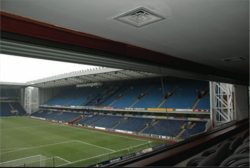Ex-Or saves penalty of unnecessary lighting at football stadium

Using presence-detection systems to switch off lighting in the North Stand of Blackburn Rovers’ Ewood Park stadium is halving lighting costs and substantially reducing lamp replacement.
Lighting costs have been halved following the installation of Ex-Or lighting controls in the North Stand of Blackburn Rovers’ Ewood Park stadium. Presence-detection systems have been installation in offices, reception areas, function suites, ticket offices, walkways, spectator areas and concourses to automatically switch off lights in unoccupied areas. They are also to be installed in staircases and private boxes. Many areas are used only on match days, yet lights were left burning needlessly every day. Before the installation, lighting accounted for over half the total electricity load at the stadium, and the annual electricity bill was over £100 000. With recent increases in electricity process, the next annual electricity bill was set to increase to nearly £180 000. Briar Associates, the consultant which commissioned the Ex-or systems after carrying out a survey funded by The Carbon Trust, estimates that £40 000 a year will be saved once the entire lighting-control project is completed. Stadium manager John Newsham highlights another benefit of the control systems. Before each Saturday game in the season, it was quite usual for staff to replace up to 300 failed lamps around the stadium. Now lights are on much less, only a handful of lamps in the North Stand need replacing before each match — saving staff time and the cost of replacement lamps. Following the success of this project, John Newsham is planning to install similar controls in the other two stands.
Related links:


